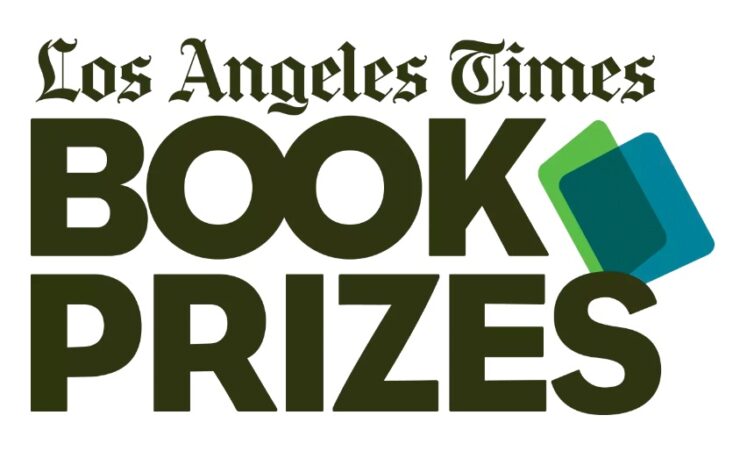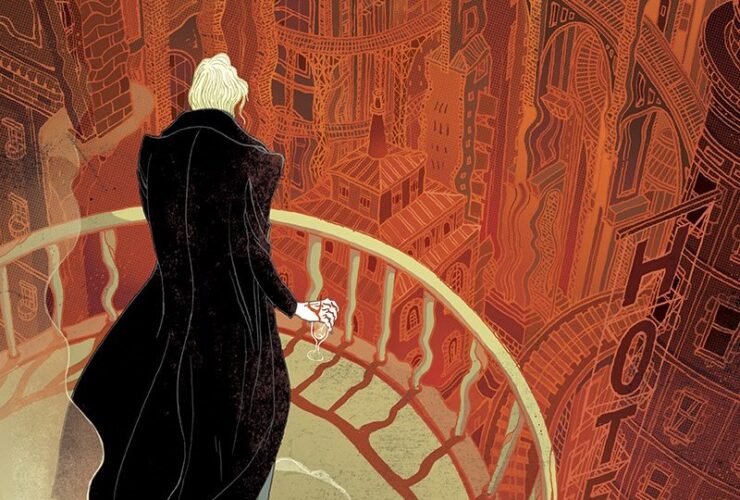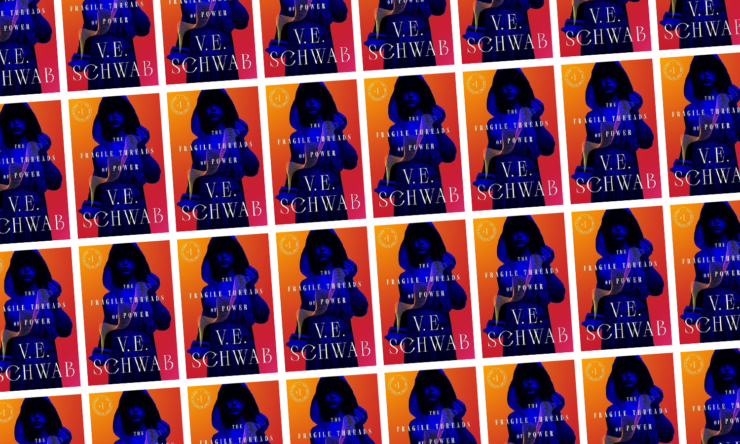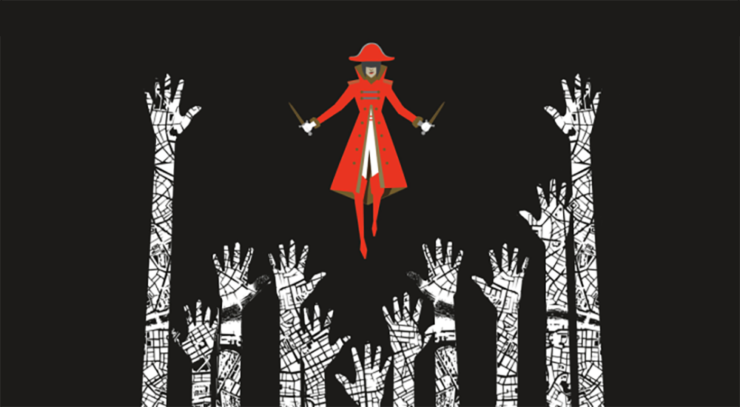Earlier this year, author V.E. Schwab delivered the sixth annual J.R.R. Tolkien Lecture on Fantasy Literature at Pembroke College, Oxford. With her permission, we are proud to present the text of that lecture; you can also find a complete video of the lecture and the excellent Q&A session that followed here, and also embedded below.
I have a confession to make:
I haven’t read The Lord of the Rings, or The Hobbit. I do not consider myself a well-versed fan of Tolkien, let alone an expert. I have nothing against the titular author of this lecture series, of course—in fact, when I was awarded the immense opportunity of delivering this talk, I considered dropping everything to read those books. Not because I wanted to, but because how could I step up to this podium otherwise? Fluency, if not fandom, felt expected of me.
Which is exactly why, in the end, I chose not to. I have a very strong belief that reading should be an act of love, of joy, of willing discovery. That when we force someone across the wrong literary threshold, we risk turning them away instead of ushering them through.
I was at a book conference earlier this year, on a panel, when this idea came up. The concept of gateway books. The stories responsible for making us into readers. Ironically, it was the topic of Tolkien that set the debate off. A male author on the panel said—and I’m paraphrasing because I wasn’t taking notes, but the words are more or less burned into my mind—he said that a person shouldn’t be allowed to consider themselves a lover of science fiction or fantasy if they hadn’t read Tolkien. That his work should be required reading.
Required reading. A dangerous label, that. As the Guest of Honor at this conference, and as someone who’s already admitted to you that she hasn’t achieved that designation, I challenged him. Why? Why was Tolkien the threshold, the marker, the metric by which membership in this club should be determined? And the author said, simply, “Because he made me a reader. Because without him, I wouldn’t be here.”
Which is wonderful, for that author, and for anyone who found their way to reading via Tolkien’s hallowed halls. But there isn’t one door through which we must find a love of reading, or nothing. In fact, such a prescription is dangerous, limiting. What happens, when a budding reader is handed a book and told, if you don’t love this, you don’t love fantasy? Setting aside the fact it’s unfair to put that much weight on one book, it is equally unfair to put that much pressure on one reader.
I told the man on the panel I had never read Tolkien, and he looked at me not with derision exactly, but with such open astonishment, as if wondering how I found my way into that chair, onto that panel, into the building, onto the pages of books, without him. And I simply said, “I found another door.”
It didn’t seem to occur to him there could be more than one. But that is the beauty of readership. It does not matter how we find our ways in—Boxcar Children, The Bourne Identity, Anne McCaffrey, or Stephen King. What matters is that we find them.
Buy the Book
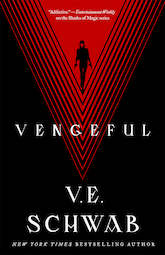

Vengeful
I was eleven when I found my door. An only child and over-achiever, I was a capable reader, but not an enamored one. I’d yet to find a story that could make the pages of a book disappear, one that could make me forget I was looking at words on paper the way a good movie makes you forget the cinema seat, the edges of the screen.
And then a family friend called my mum. She was at a bookstore in Southern California, and there was an author there signing her debut novel. It was geared toward kids my age, and the friend asked my mum if I might like a signed copy. My mother, knowing I wasn’t a passionate reader, but not wanting to be rude, said yes, sure, that would be nice, and a week later, the book arrived in the mail.
It wasn’t very thick, but it had an illustration on the front of a boy on a broomstick, flying through an arch. If you haven’t guessed, it was called Harry Potter and the Philosopher’s Stone (well, Sorcerer’s Stone—this was, after all, in the States). The author, the one my mother’s friend just happen to stumble on in the bookshop, was of course, J.K. Rowling.
This sounds like the beginning of a familiar story, I know.
So many of my generation owe a debt to Rowling: for fostering a love of story, but the simple fact is that without her, without that series, I’m not sure when I would have developed a fondness for books. Certainly not until much later. Harry Potter was the first time when I fell in love. The first time I forgot I was reading words, because I felt like I was watching a film inside my head. The first time I forgot where I was. Who I was. Harry Potter—and J.K. Rowling—provided me my first taste of true narrative escape, and from that moment I was hooked. Mesmerized by the idea that someone could use words that way, to transport. The alchemy of translating letters into stories. It was, pure and simple, magic. And it made me a reader. It was my door.
But I would never set those books before someone and say, “If you do not love these, you are not a reader. If these do not speak to you, you are not one of us.” Because it does not matter which door you take, so long as you find one. Some of us find the door young, and some don’t. My father, who is 69 years old, has found his love of reading in the six months since he’s retired, proving there is no expiration date on doors.
Nearly twenty years after I stepped through my own, here I am.
People often ask me why I write fantasy. I used to only have one answer. Because I grew up wanting the world to be stranger than it was. Now I think, what I meant, what I mean, is that I also wanted it to be more.
I was the kind of child who scoured the piled stone hills behind my grandmother’s house in Tahoe, looking for cracks shaped like doorways, grooves shaped like keyholes. I would run my hands over the rocky surface and try to remember a magic I’d never known. A password I convinced myself I’d simply forgotten. I told myself that if I could just remember the right word, the door would open, and I would find that other world I was so convinced was there. That was my youth—spent looking for doors. Not because I was unhappy—I had the kind of loving upbringing that registers in your memory as a painting instead of a film, a still life. My mother is a dreamer, and my father is a diabetic, and aside from her occasional outbursts and his occasional episodes, it was a perfectly stable, if rather solitary, childhood.
I searched for ways out not because I was miserable, or lost, but because I couldn’t shake the feeling that there was more. That the world was bigger and stranger and more magical than the one I could see. I suppose, in some ways, it was my version of faith. A belief in something you cannot see, cannot prove. But you search for it all the same.
I grew up wanting the world to be stranger than it was, in large part because I hadn’t found my place in the version that was. Or rather, because I’d only found my place in the pages of books. I wanted to be Alanna, and Hermione Granger. I wanted to be Jason Bourne, Jonathan Strange, Katniss Everdeen, King Arthur, and Sabriel. I wanted to be powerful, and important, and free. I wanted to find the keys to the world. I wanted to see myself, and be someone else at the same time, wanted to be reinvented as someone stronger. I never went looking for happiness, never folded myself up in romance.
What I wanted were the adventures.
I wanted to wander the world of the dead, wanted to cast spells, and wear battle armor, fight spies and topple empires, and tap into the well of magic I knew was inside me, waiting to be woken, the same way I knew the world was big and strange, even if I couldn’t see it yet.
That is the power of fantasy. Of fiction. Of story. Of words.
We’re taught in school to use words carefully, to use them kindly, to use them well. But we are never truly taught—at least not in a classroom—how much magic they truly have.
I discovered that magic first as a reader. But it wouldn’t take me long to realize that the power words held over me was a power I could wield. Once I discovered that, I was unstoppable. Insatiable. I still am. Creativity is not only a potent magic. It is also an addictive one.
Before I was born my mother had a prophecy read over me. It was that kind of family. It wasn’t the most generous prophecy, but it was incredibly specific. Some pieces were unsettling, and some were startlingly accurate—I would be from the beginning an outsider, a keen observer, a social mimic, lost inside my own head—but the part I loved best was the part where the psychic said I would have a gift for words. A gift she wasn’t sure I would use for good. She predicted I would either become a cult leader, or a novelist. And whether or not you believe in any of this, it never fails to delight me that spinners of stories rank with swayers of minds and faith. A cult leader, or a novelist. The power to move masses. To hypnotize, or indoctrinate, or enthrall. Words are powerful things.
I often joke that writers are the gods of their own world. We are certainly its most adept magicians. Many authors talk about finding their way through their stories, about the mystery and the surprise and the reveal. They speak of their stories as things that already exist, entities waiting to be discovered, uncovered, explored, understood. They see themselves as mediums. Conduits.
But I have always seen myself as a conjurer.
Putting piece after piece, ingredient after ingredient, into the cauldron until the spell takes shape, the contents become more than the sum of their parts. That’s what spirits are, in bodies, that unquantifiable spark. That’s what stories are, too. They are what happens when ideas and words thread together into something more. A sentence is letters plus spaces plus meaning. A story is a sentence on a larger scale. It is alchemy. The transmutation of one element into another through some variable combination of method and madness. Impossible to quantify the ratios because they are different for all of us.
Believe it or not—and it’s becoming harder to believe some thirteen books in—I never set out to write novels. I’m an intensely visual person—I see everything before I write it down, I block and choreograph every beat, roll through the seconds of mental film, cut to different cameras in my head, different angles. Every scene comes with its own color palette. Every moment comes with an underlying soundtrack. I was a decent artist, but I couldn’t find a way to fully bring what I saw to life using pens, ink, paint. So I wrote.
When I was a kid, I would write screenplays, and then force my friends and neighbors and family to act them out, just so I could see the story played out before my eyes instead of behind them.
As I grew up, I became more attached to the words themselves, as if each one were indeed part of a larger incantation. There was magic in order, and cadence, syllable and flow. For years everything I wrote came out in meter and verse. Poetry felt like the most distilled form of power. I was fifteen when I won my first poetry contest.
I still remember the poem, its eight short lines woven into the fabric of my memory:
Perhaps the moon
Is in the sea
Reflecting up
Against the skyAs night beams bathe
In ocean waves
And all the stars
Swim by.
I loved poetry, but as the stories in my head grew more and more elaborate, I knew I hadn’t found the right form. It wasn’t until I got to college—wasn’t until I’d tried short fiction, and non-fiction, and micro-fiction, and screenplay, and journalism, before I realized why I hadn’t tried to write a book.
I was afraid. Afraid I didn’t have the attention span. Afraid I wasn’t smart enough to build something that large. Afraid it would collapse. Afraid I would fail. Luckily for me, I have a rather adversarial nature when it comes to fear. I had a fear of heights, so I went skydiving. I had a fair of change, so I cut off all my hair. I had a fear of leaving home, so I backpacked through Europe. I had a fear of failing to write a book, so I sat down, and started.
I wrote my first novel, and it was terrible, as all first novels should be. But it was a start. And the high of not only starting a story, but finishing it, was the most addictive sensation. I was hooked.
Since that first foray, I’ve always written fantasy. Now and then I’ve tried to dip my toe in realistic fiction, but within a few chapters, I invariably find myself longing for a demon, or a ghost, a way to make the world stranger.
Fantasy, it must be said, is a very large umbrella. Some insist on breaking it down into further, smaller shelters—speculative, high fantasy, second world, urban, supernatural thriller, fairy tale, magical realism, and so on. And yet, for such a broad concept, we too often seem to have a narrow vision of it. It need not always have wizards or dragons, necromancy or magic or chosen ones or worlds we cannot touch.
I have written about witches on the English moors. Libraries where the dead are shelved like books. Superpowers born of near-death experiences. Elemental magic in alternate Londons. Cities where violence breeds monsters.
Buy the Book
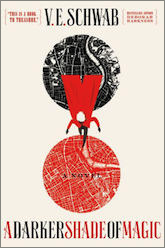

A Darker Shade of Magic
When I say fantasy, I simply mean, a story in which one foot—or heel, or toe—is not planted on firm, familiar ground. But my favorite fantasies are the ones where the other foot is, where the line between the known and the new, the observable reality and the strange fantastic, is dotted, blurred. It goes back to my childhood, searching those Lake Tahoe hills for cracks in the stone that might be doors. Because a fantasy set entirely in another world is an escapism with limits. You can read about it, sure, but you can never really get there. A fantasy with a door, a portal, a way in, that breeds a different kind of belief.
It is the difference between Tolkien and C.S. Lewis. Middle-earth is accessible only on the page. But Narnia had a door in the back of a wardrobe. That wardrobe is not simply a piece of furniture, it is an object that instills doubt—doubt that the world is as simple or mundane as it seems—the kind of doubt that makes a child climb into every cupboard and armoire they can find, looking for doors. When we make readers doubt their own reality, even a little, we grant them hope for a different one.
Writers of fantasy possess a special kind of magic.
We have the ability to change the world.
Writers of the speculative have the incredible opportunity to speculate. To reinvent and reimagine. We have the power to create spaces where diverse readers can see themselves, not only as tangential, but as essential. Fantasy authors have the opportunity to tell stories about characters whose real-life analogs are so often cast to the outside edges of the narrative, and to center those too often relegated to its fringes.
Which is why it’s disheartening, if I’m being generous, and maddening, if I’m being honest, to see so many new stories conforming to such old conceits. To see so many contemporary fantasy authors subscribing to antiquated models, either because of nostalgia, or the ease of well-worn roads, or, more likely, because they still feel adequately represented by them.
What a waste. The most beautiful part of writing fantasy is the freedom, not from rules—because we all know that good stories need good worlds, and good worlds, whether they’re rooted in fantasy, sci-fi, or realism, require solid scaffolding—no, not from rules, but from the exact details of the present we inhabit.
We have the opportunity to subvert the established tropes, to redefine power, to conceive of social landscapes and climates perpendicular to the ones in which we live. Fantasy allows us to explore the strengths and weaknesses of our own world through the lens of another. To draw a concept from its natural framework, its classic, well-worn context, and examine the underbelly of the idea. To restructure, and re-center. Fantasy affords the luxury of close examination—of the self, and of society—laid within a framework of escapism. It can be a commentary, a conversation, and it can simply be a refuge.
Good Fantasy operates within this seeming paradox.
It allows the writer, and by extension the reader, to use fictional and fantastical analogs to examine the dilemmas of the real world.
But it also allows the reader to escape from it. To discover a space where things are stranger, different, more.
In my opinion, there is no such thing as pure Fantasy.
Fantasy, like all stories, has its roots in reality—it grows from that soil. Stories are born from “what if…”, and that is a question that will always be rooted in the known. “What if…” by its nature is a distillation of “What if things were different?” And that question depends on a foundation of what we want them to be different from. In that sense, all fantasy is in conversation with a reality we recognize. It is a contrast, a counterpoint, and in my opinion the best fantasies are those which acknowledge and engage with that reality in some way.
Perhaps that means we see the world we are leaving—we board the train to Hogwarts, we step through the wardrobe—or perhaps we simply acknowledge the foundations on which our story is born and from which we are departing.
I’m not advocating for fantasy as an overt metaphor. The questions and counterpoints need not be the driving force of the narrative—as with Le Guin’s Left Hand of Darkness—but that question, “what if…?”, is strongest when it challenges the world we already know, and finds a way to pivot from it. To ask more interesting questions. To tell new stories.
Because, I must confess, I am tired of one true kings.
I am tired of stories centered around a young white man learning how to wield power, as if the real world doesn’t already do enough to prepare them.
I am tired of stories where women are either princesses or whores or manic pixie dream girls who have no story of their own but exist only as plot devices, obstacles, or pit stops on the quest of the male lead.
I am tired of stories that look and feel, act and behave, exactly like the world in which we already live, because they subscribe to the same conceptions of hierarchy, the same delineation of power, the same accepted norms.
And as tired as I am, I cannot fathom how tired some of my colleagues are. What seem like hills to me must be mountains to authors of color. I know that. I can only hope that, in helping to create commercial fantasy that breaks these old molds, I can also make space for others to do the same. Hold open a door.
I love this space, I love fantasy, and I love what it has the potential to become. There is this fear I sense from authors—most of them white, straight, male—as if moving forward means leaving the past—their past—behind. And perhaps, in reality that is true, but in fiction, the rules do not apply. The old is not erased by the new, it is not replaced by the new. It is only made better, stranger, more.
And that is why I write fantasy, why I’ve always written fantasy, to make the world stranger than it is, better than it is, more than it is. I write fantasy because I want to feel the way I felt when I stood on my grandmother’s stone hills, searching for doors. The way I feel when the air suddenly shifts and I can smell the energy in our world like the beginnings of a brewing storm. I don’t write to create a magic that isn’t there. I write to access a magic that is. To amplify it so that others feel it, too.
I write fantasy to make cracks in the foundation of a reader’s expectations, to challenge the solidity of their assumptions and beliefs.
I write fantasy because I want to bolster the believers, and make the skeptics wonder, to instill doubt and hope in equal measure. To help readers envision a time, a place, a world in which fantastical concepts like magic, or immortality, or equality, seem within reach.
My favorite stories are the ones laid like gossamer over our own world. The ones that make magic feel close at hand, that promise us there is a door, even if we haven’t found it yet. The ones that make us doubt our senses. The way a paranormal experience, or a near-death experience, or a spiritual experience, makes a cynic doubt their own established and accepted truths.
One of the most satisfying experiences I’ve ever had revolves around my novel, Vicious. It is a book about two pre-med students who discover the key to superpowers are near-death experiences—that the proximity of fatality can trigger a permanent adrenal shift. I threaded my magic through science. Took what is, and nudged it just a measure into what could be, and about three months after that book came out, I got an email from a man, who couldn’t sleep until I told him the truth: was any of it real?
A full-grown adult sent me an email in the middle of the night, because the question, the idea, the what-if, was keeping him awake. He was sure—he was almost sure—but the doubt had crept in like kudzu in the South, peeling up the clean foundation of his mind as it made room to grow.
I wish believing were always that easy.
I wish I could write a reality that was kinder to so many of those reading my work. Wish that, like in A Darker Shade of Magic, the strength of one’s power was more important than who they loved. I wish that I could center women and LGBTQ and people of color in the real world as easily as in my books.
But until that day, I am committed to doing it in fiction.
I will write powerful women, and princes in love with princes, and worlds where the monsters that plague our own have shapes that can actually be fought, bested. I will write flawed people because people are flawed, and I will write books where those who are so often relegated to sidekick or token or object are centered in the narrative, where they have their own agency, their own power, their own story.
I will write what I love, and what I long for, in the hopes that for someone, it might be not only be a way out, but a way in.
In short, I will write in the hopes of writing someone else a door.
 Victoria “V.E.” Schwab is the bestselling author of more than a dozen books, including the Shades of Magic series and This Savage Song. Her Villains series, which began with Vicious, continues this September in Vengeful. Her work has received critical acclaim, been featured by EW and The New York Times, been translated into more than a dozen languages, and been optioned for TV and Film.
Victoria “V.E.” Schwab is the bestselling author of more than a dozen books, including the Shades of Magic series and This Savage Song. Her Villains series, which began with Vicious, continues this September in Vengeful. Her work has received critical acclaim, been featured by EW and The New York Times, been translated into more than a dozen languages, and been optioned for TV and Film.











